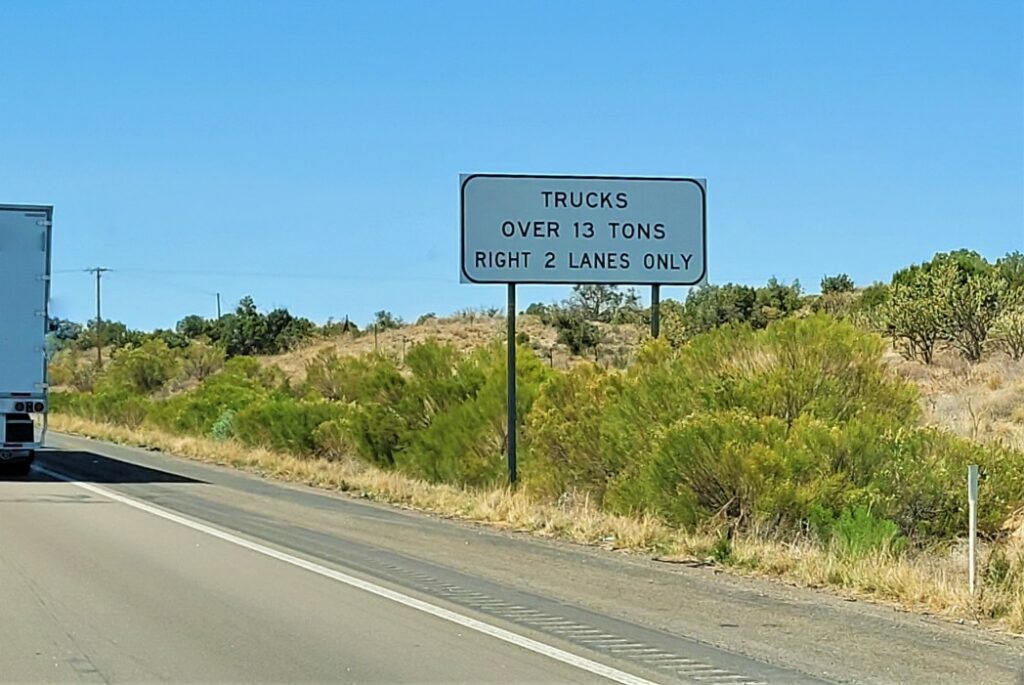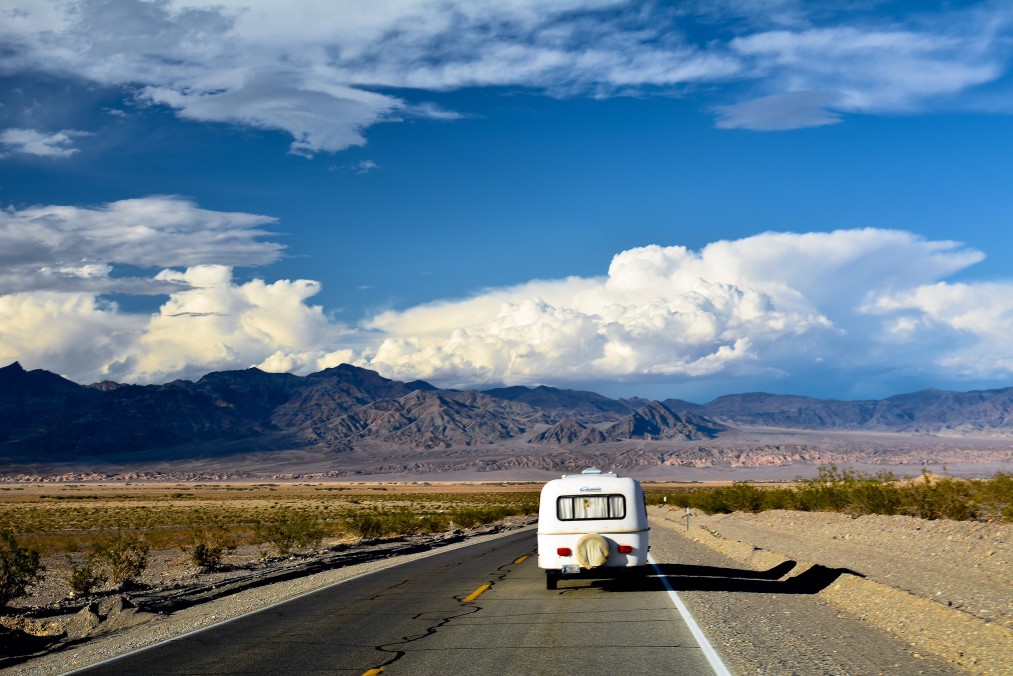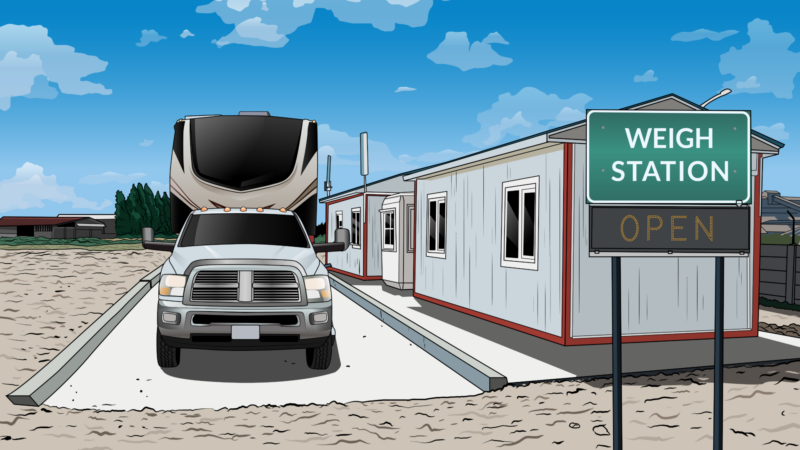Table of Contents Show
You’ve passed those signs along the interstate that say, “Weigh Station – 1 mile.” You’re driving your Dodge Ram 3500 and Grand Design fifth wheel and wonder, “Am I supposed to stop?”
Unfortunately, it’s not a yes or no answer. It depends on your rig and local laws. Let’s take a closer look at this question.
Do RVs Have to Stop at Weigh Stations?
Most states do not require privately-owned RVs to stop at weigh stations. If you operate a business out of your RV, the answer might be different.
It’s best to call the DMV of any state you’re traveling through to understand the local laws. If you choose to stop, just follow the instructions of the attendant. They may tell you to pass on through or that you don’t need to stop at other weigh stations along your journey.

What Are Weigh Stations For, Anyway?
Weigh stations check that large trucks aren’t overweight. It ensures that trucks are traveling safely and are compliant with state laws. Some highways have weight restrictions because they can only handle a certain amount of weight before breaking down.
If a truck is overweight, the trucking company can receive a fine. If a driver doesn’t stop at a weigh station, the driver can receive a fine. Fines vary from state to state.
The Department of Transportation, the Department of Motor Vehicles, or the Highway Patrol operate different weigh stations across the country. They carry out the appropriate inspections for each truck. They also collect fees, which is another reason weigh stations exist. States collect money here to help repair and build highways.
What States Require You to Stop at Weigh Stations with Your RV?
There are states where a police officer can force anyone to pull off at a weigh station. These states include Alaska, Iowa, Illinois, Kansas, New Hampshire, North Carolina, Oklahoma, Utah, Vermont, West Virginia, Maine, Mississippi, and Texas.
Don’t fret if you’re asked to do so. Just follow the instructions the officer gives, and it’ll all work out.
Some states require all commercial vehicles to stop at a weigh station, including California, Connecticut, Kansas, and Texas. If you operate a business out of your RV, call the state’s DMV office before traveling and ask if they want you to stop at a weigh station.
Other states have a 10,000 lb minimum guideline for these commercial vehicles. These states are Alaska, Arizona, Florida, Hawaii, Indiana, Kentucky, and Maryland.

Finally, some states require all RVs over 10,000 pounds to stop. Arkansas, Georgia, Iowa, Louisiana, Massachusetts, Michigan, Minnesota, Nevada, North Dakota, Ohio, Rhode Island, Washington (State), and Wisconsin require privately-owned RVs, specialty vehicles, passenger vehicles, and trailers over 10,000 lbs to stop.
Again, if you have any questions or want to verify whether or not you need to stop, contact the state’s DMV office.
And then you have unique laws for certain states. For example, if you’re towing a trailer or fifth wheel or driving an RV in Pennsylvania, you’ll need to stop at a weigh station. In Delaware, the officials require RVs over 46 feet to stop (that number includes the tow vehicle’s length). In New Jersey, all vehicles over 10,000 lbs must stop, regardless of the vehicle type.
Are There Weight Limits That Exempt or Require You to Stop?
As mentioned above, the magic number seems to be 10,000 lbs. Knowing your Gross Vehicle Weight Rating (GVWR) is essential, not just for bypassing weigh stations but for overall travel safety.
Your RV’s “dry weight” is how heavy it is when it leaves the manufacturer without any cargo. The cargo capacity is any weight you can safely add to the RV. Add this to the dry weight, and you get the RV’s GVWR, the maximum weight your vehicle can carry.
The Gross Combined Weight Rating (GCWR) is the maximum weight of the tow vehicle plus the RV. This number is important to know because if your truck and RV are over 10,000 lbs, you’ll have to know each state’s weigh station laws.

Pro Tip: Make towing a fifth wheel or travel trailer smoother and safer with the best weight distribution hitch.
What Happens If You Don’t Stop at a Weigh Station with Your RV?
Perhaps nothing will happen if you don’t stop at a weigh station. Or perhaps an official will reroute you and escort you back to the weigh station. You could pay a fine, but it’s doubtful that you’ll be facing jail time unless you’re a repeat offender.
How to Find Out Your RV’s Weight
Search for a CAT scale along your route. Many truck stops have CAT scales, which provide accurate weight measurements for large vehicles. That’s why you’ll find them at truck stops.
If you have a towable RV, you can weigh your truck and RV combined to get a total weight. Then, go drop the travel trailer or fifth wheel in a parking space and return to the CAT scale to weigh just the truck.
Then, you’ll have a good idea of how much your RV weighs by subtracting the truck’s weight from the total weight.
How to Find a Weigh Station Near You
Google or Apple maps will tell you the location of the nearest weigh station. You can also use a website called Coops Are Open to find weigh stations.
Usually, you’ll see signs a mile or so before a weigh station to give you a heads up that a location is coming up on your route.
Pro Tip: Have you ever wondered if RVs can use truck stop fuel stations? Find out before you hit the road next.
Can You Avoid Weigh Stations While Traveling in an RV?
The best way to avoid weigh stations is to pre-plan your route. You can take an alternate route if you look at your travel route ahead of time. However, the danger in doing this is traveling on roads that aren’t safe for your RV.
Keep in mind that RVs are longer, taller, wider, and heavier than most other vehicles. Google and Apple maps may take you on backcountry roads that aren’t safe for driving an RV. Plus, there could be low clearance bridges or narrow roads.

When in Doubt, Just Stop
If you have any doubt or have questions about weigh stations, don’t hesitate to call the local DMV office. It will save you time and reduce your anxiety just to have a clear answer.
For most states, just put your foot on the gas pedal and keep traveling down the interstate. And if you have a vehicle under 10,000 pounds, you have even less to worry about. Know the GVWR and visit a CAT scale often during your travels to stay safe.
But if you’re unsure, it doesn’t hurt to stop. If you don’t need to be there, the attendant will tell you and send you on your way. It’s better to waste a few minutes at a weigh station than to end up with a ticket!
Have you weighed your RV recently?







Have you stopped at any weigh stations when you have traveled through the states that would require a rig your size to stop?